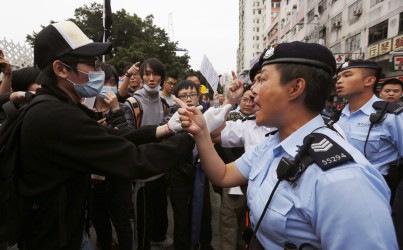Occupy Central
Occupy Central is a civil disobedience movement which began in Hong Kong on September 28, 2014. It calls on thousands of protesters to block roads and paralyse Hong Kong's financial district if the Beijing and Hong Kong governments do not agree to implement universal suffrage for the chief executive election in 2017 and the Legislative Council elections in 2020 according to "international standards." The movement was initiated by Benny Tai Yiu-ting (戴耀廷), an associate professor of law at the University of Hong Kong, in January 2013.
Umbrella Movement
The Umbrella Movement (Chinese: 雨傘運動; pinyin: yǔsǎn yùndòng) is a loose political movement that was created spontaneously during the Hong Kong protests of 2014. Its name derives from the recognition of the umbrella as a symbol of defiance and resistance against the Hong Kong government, and the united grass-roots objection to the decision of the Standing Committee of the National People's Congress (NPCSC) of 31 August.
The movement consists of individuals numbering in the tens of thousands who participated in the protests that began on 28 September 2014, although Scholarism, the Hong Kong Federation of Students, Occupy Central with Love and Peace, groups are principally driving the demands for the rescission of the NPCSC decision.
The movement consists of individuals numbering in the tens of thousands who participated in the protests that began on 28 September 2014, although Scholarism, the Hong Kong Federation of Students, Occupy Central with Love and Peace, groups are principally driving the demands for the rescission of the NPCSC decision.
POST OCCUPY CENTRAL - DAY 94:
Full coverage of the day’s events on 19-03
Hong Kong police told to 'be stricter over public gatherings of at least three people'
All police officers are to enforce laws governing public order "more strictly" to prevent any "suspicious" gathering of at least three people from turning into a protest, according to a new guideline.
White elephant claims overblown, except ...
Government officials have taken great pains to spare funding for the third runway from filibustering by conceiving a plan requiring no direct government spending.
But they can't do much to avoid a spat with the SAR's former aviation chiefs. Worse still, the tussle is escalating.
Are the claims and counter-claims valid?
In one corner are former civil aviation directors Albert Lam Kwong-yu and Peter Lok Kung-nam. In the opposite corner are government authorities in charge of the HK$141.5 billion project.
The issue is technical about airspace management rights. Admittedly, it may be too technical for some, but the issue is too important to ignore.
Here's the preamble: China has for a long time imposed a boundary called the "sky wall" to separate Hong Kong's air space from that of the mainland.
Visible only on radar, the wall stipulates aircraft leaving the SAR must climb to at least 4,800 meters (15,750 feet) before they can enter mainland air space.
Therefore, flights have to circle above Hong Kong to reach the altitude. This limits the number of flights Chek Lap Kok airport can handle.
The third runway is being built to increase the number of flights per hour from 68 to 102. Can the Airport Authority achieve such a target? That's the HK$141.5 billion question.
Lam, for example, says it can only do so on condition the issue of the sky wall limit is resolved in Hong Kong's favor. However, this would require Shenzhen and Zhuhai to give up some of their air space.
But will they?
Prior to the government announcement on the new runway, Lam told a press conference that Hong Kong doesn't have the air space to handle the higher capacity.
He criticized present officials for mistaking a 2004 attempt to resolve the issue as a consensus already reached by the various parties.
He said there is no such consensus.
That's a surprising revelation.
If Lam is correct, it will cast uncertainty on the usefulness of the new runway even after the megabucks are splashed out.
Could government officials be so careless as not to secure an agreement before announcing the project?
The authorities hit back, saying Lam's views are outdated. Some insiders even denounced him as a traitor.
On the record, the government said the problems will disappear in five years, with transport minister Anthony Cheung Bing-leung saying the issue will be negotiated further, based on an understanding reached in 2007.
Lam demanded to know what that understanding was.
His concerns have wings, as the investment will be too large to allow the new runway to become little more than an international exhibit.
What Lam has pointed out is more substantial than the environmental issues and must be addressed.
Negotiating with the mainland is complicated, given the current strained relations between Hong Kong and Beijing.
It will be in our best interest to track the progress of the Express Rail Link, which is in danger of becoming a slow rail link, due to disagreement over reaching a common immigration and customs clearance arrangement.


沒有留言:
張貼留言